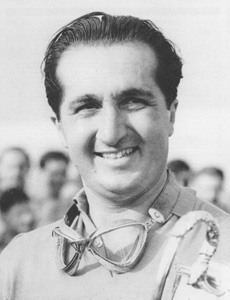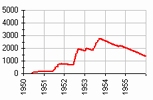Гонщики, A | |
Ascari, Alberto Курсивом отмечены гонщики, |
| Альберто АскариAscari, Alberto |
 (c) 'Who is Who' by Steve Small, 2000 Родился: 13.07.1918 Милан Умер: 26.05.1955 трасса Монца Сезонов в Ф1: Лет в Ф1: 6 Гран При: Старты: 32* *не стартовал: 1 Победы: - подряд: 7 Подиумы: - подряд: 7 Поул-позиции: - подряд: 4 Первый ряд: - подряд: 7 Быстрые круги: - подряд: 7 Лучший финиш: Лучший старт: 1 Дубли: Хет-трики: 7 Лидирование старт/финиш: Большие шлемы: |
Год | Команда | Шасси |
The son of a famous racing driver - his father, Antonio, was killed at Montlhéry when the young Ascari was just seven years old - it was perhaps inevitable that Alberto should also follow a career in the sport. After racing Bianchi motor cycles from 1937, he drove the very first Ferrari T815 sports car in the 1940 Mille Miglia with his cousin Minozzi, the pair leading their class before retirement.
The war soon brought racing to a halt in Italy, and it was 1947 before he was back in action. Second place in a little Cisitalia in a one-make race at Gezereh Island behind Cortese brought him to the fore, and he was soon impressing with his speed behind the wheel of a Maserati 4CLT. His first major success was in a sports car race at Modena that year, and he benefited greatly from the tutelage of team-mate Villoresi, whom he beat to win the 1948 San Remo GP. He was second to his mentor in the British GP and even drove once for rivals Alfa Romeo, finishing third in the French GP at Reims.
After winning the 1949 Buenos Aires GP for Maserati, both Ascari and Villoresi left for Ferrari, where Alberto was to enjoy spectacular success. In his first season he won the Swiss, Italian and Peron GPs in the T125. In 1950, Alfa were back in competition with their 158s and Ferrari concentrated mainly on Formula 2, winning a succession of races at Modena, Mons, Rome, Reims, Garda and the Nürburgring, while their T375 F1 car was being developed. He did, however, take a second at Monaco, and at season's end won the Penya Rhin GP at Barcelona in the new 4.5-litre car.
In 1951 Ascari won two Grands Prix as at last the might of Alfa was beaten, but the championship went to Fangio. With the change of formula restricting GP racing to 2-litre cars for 1952 and the Alfa team disbanded, Alberto was sitting pretty. His task in taking the championship was further eased by the absence of the injured Fangio, and missing the Swiss GP to compete at Indianapolis merely denied him the opportunity of a clean sweep, as the brilliant Italian surged to six championship victories, in addition to wins at Syracuse, Pau, Marseilles, Comminges and La Baule.
It was much the same in 1953 when he trampled on the opposition to take five more championship wins, adding victories at Pau and Bordeaux to his burgeoning tally. The run of success came to a halt with a move to Lancia for 1954 which left Ascari frustrated as the car was delayed until the end of that year. He did win the Mille Miglia in a Lancia sports car and was allowed to appear as a guest driver for both Maserati and Ferrari, putting in a brilliant drive at Monza against the works Mercedes.
With the Lancias 'au point' at the start of 1955, Ascari led the Argentine GP until he lost control of the car on melting tar, won the non-championship Turin GP and Naples GP at Posillipo, and led at Pau before finishing fifth. At the Monaco GP Alberto famously crashed his car into the harbour, emerging with facial injuries, but four days later he turned up unexpectedly at Monza to test a Ferrari sports car in preparation for the forthcoming Supercortemaggiore race. For some inexplicable reason Ascari crashed the car, and he was thrown onto the track and killed instantly. While the Italian nation mourned the loss of its finest driver, Fangio is reported to have said: 'I have lost my greatest opponent.' Clearly this was true, but close scrutiny of their careers reveals that only rarely did they have the opportunity to race against each other in equally matched machinery.
(c) 'Who is Who' by Steve Small, 2000
| © WildSoft, 1995-2020 |


